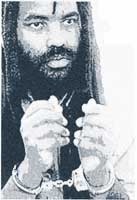From Mumia Abu-Jamal on death row
The forgotten Martin Luther King
Published Jan 30, 2009 11:35 PM
The following excerpts come from a recording made on Jan. 15, Dr.
King’s 80th birthday. Go to www.prisonradio.org to hear Mumia’s
audio columns.
The Rev. Dr. Martin Luther King Jr. is once again being resurrected this
time of year, in part because his birthday is approaching, but also, of course,
because of the imminent swearing-in of President-elect Barack H.
Obama—the first Black man in U.S. history to be so honored.
As often is the case, the Rev. King—who is being projected
today—bears little relationship to the real, live, breathing and growing
man behind the name.
Like many men, he had his highs and his lows, his fears and his doubts, his
inspirations and his insights. His Washington speech—known as “I
Have a Dream”—was neither his finest, nor his most profound, but
like many Black preachers who are master orators, he brought his best to
it.
King, like many busy leaders, had others write some of his speeches, and one of
those men was Vincent Harding, now a theologian and historian. Harding
contributed to King’s groundbreaking N.Y. Riverside Church speech,
delivered precisely a year before his assassination, where he denounced the
Vietnam War—marking his break with an American president (L. B. Johnson),
the corporate media and many of his closest allies in the SCLC (Southern
Christian Leadership Conference).
President Johnson felt betrayed by King, and the media turned from praise to
ridicule. In his book “Martin Luther King: The Inconvenient Hero”
(N. Y.: Orbis, 1996), Harding quotes from the Washington Post editorial page
which slammed King, who “had diminished his usefulness to his cause, to
his country, and to his people” because of his speech against the Vietnam
War, which the Vietnamese called “the American War.”
But betrayals didn’t stop him, nor did nasty editorials deter him.
Indeed, the violence of war radicalized him deeply, so much so that he said
later, “The evils of capitalism are as real as the evils of militarism
and evils of racism.” (Harding, p. 101).
Think of that: capitalism, militarism and racism—as evils. When’s
the last time you’ve heard that?
Rev. Dr. Martin Luther King Jr. was being radicalized by the churning events
around him—and, a year before his death, he was both anti-war and
anti-capitalist.
Ask yourself, if King were alive today, with his views, could he be elected
president?
If not, why not? What does that say about the nation’s political system?
Articles copyright 1995-2012 Workers World.
Verbatim copying and distribution of this entire article is permitted in any medium without royalty provided this notice is preserved.
Workers World, 55 W. 17 St., NY, NY 10011
Email:
[email protected]
Subscribe
[email protected]
Support independent news
DONATE


